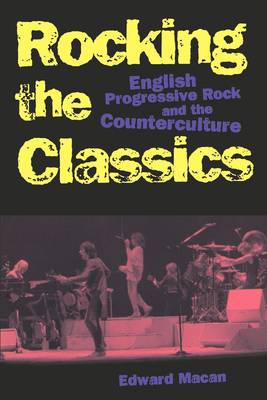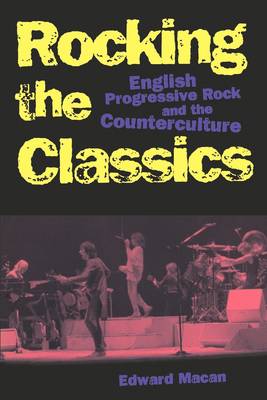
Wil je zeker zijn dat je cadeautjes op tijd onder de kerstboom liggen? Onze winkels ontvangen jou met open armen. Nu met extra openingsuren op zondag!
- Afhalen na 1 uur in een winkel met voorraad
- Gratis thuislevering in België vanaf € 30
- Ruim aanbod met 7 miljoen producten
Wil je zeker zijn dat je cadeautjes op tijd onder de kerstboom liggen? Onze winkels ontvangen jou met open armen. Nu met extra openingsuren op zondag!
- Afhalen na 1 uur in een winkel met voorraad
- Gratis thuislevering in België vanaf € 30
- Ruim aanbod met 7 miljoen producten
Zoeken
Rocking the Classics
English Progressive Rock and the Counterculture
Edward Macan
Paperback | Engels
€ 48,95
+ 97 punten
Uitvoering
Omschrijving
Few styles of popular music have generated as much controversy as progressive rock, a musical genre best remembered today for its gargantuan stage shows, its fascination with epic subject matter drawn from science fiction, mythology, and fantasy literature, and above all for its attempts to combine classical music's sense of space and monumental scope with rock's raw power and energy. Its dazzling virtuosity and spectacular live concerts made it hugely popular with fans during the 1970s, who saw bands such as King Crimson, Emerson, Lake and Palmer, Yes, Genesis, Pink Floyd, and Jethro Tull bring a new level of depth and sophistication to rock. On the other hand, critics branded the elaborate concerts of these bands as self- indulgent and materialistic. They viewed progressive rock's classical/rock fusion attempts as elitist, a betrayal of rock's populist origins.
In Rocking the Classics, the first comprehensive study of progressive rock history, Edward Macan draws together cultural theory, musicology, and music criticism, illuminating how progressive rock served as a vital expression of the counterculture of the late 1960s and 1970s. Beginning with a description of the cultural conditions which gave birth to the progressive rock style, he examines how the hippies' fondness for hallucinogens, their contempt for Establishment-approved pop music, and their fascination with the music, art, and literature of high culture contributed to this exciting new genre. Covering a decade of music, Macan traces progressive rock's development from the mid- to late-sixties, when psychedelic bands such as the Moody Blues, Procol Harum, the Nice, and Pink Floyd laid the foundation of the progressive rock style, and proceeds to the emergence of the mature progressive rock style marked by the 1969 release of King Crimson's album In the Court of the Crimson King. This "golden age" reached its artistic and commercial zenith between 1970 and 1975 in the music of bands such as Jethro Tull, Yes, Genesis, ELP, Gentle Giant, Van der Graaf Generator, and Curved Air.
In turn, Macan explores the conventions that govern progressive rock, including the visual dimensions of album cover art and concerts, lyrics and conceptual themes, and the importance of combining music, visual motif, and verbal expression to convey a coherent artistic vision. He examines the cultural history of progressive rock, considering its roots in a bohemian English subculture and its meteoric rise in popularity among a legion of fans in North America and continental Europe. Finally, he addresses issues of critical reception, arguing that the critics' largely negative reaction to progressive rock says far more about their own ambivalence to the legacy of the counterculture than it does about the music itself.
An exciting tour through an era of extravagant, mind-bending, and culturally explosive music, Rocking the Classics sheds new light on the largely misunderstood genre of progressive rock.
In Rocking the Classics, the first comprehensive study of progressive rock history, Edward Macan draws together cultural theory, musicology, and music criticism, illuminating how progressive rock served as a vital expression of the counterculture of the late 1960s and 1970s. Beginning with a description of the cultural conditions which gave birth to the progressive rock style, he examines how the hippies' fondness for hallucinogens, their contempt for Establishment-approved pop music, and their fascination with the music, art, and literature of high culture contributed to this exciting new genre. Covering a decade of music, Macan traces progressive rock's development from the mid- to late-sixties, when psychedelic bands such as the Moody Blues, Procol Harum, the Nice, and Pink Floyd laid the foundation of the progressive rock style, and proceeds to the emergence of the mature progressive rock style marked by the 1969 release of King Crimson's album In the Court of the Crimson King. This "golden age" reached its artistic and commercial zenith between 1970 and 1975 in the music of bands such as Jethro Tull, Yes, Genesis, ELP, Gentle Giant, Van der Graaf Generator, and Curved Air.
In turn, Macan explores the conventions that govern progressive rock, including the visual dimensions of album cover art and concerts, lyrics and conceptual themes, and the importance of combining music, visual motif, and verbal expression to convey a coherent artistic vision. He examines the cultural history of progressive rock, considering its roots in a bohemian English subculture and its meteoric rise in popularity among a legion of fans in North America and continental Europe. Finally, he addresses issues of critical reception, arguing that the critics' largely negative reaction to progressive rock says far more about their own ambivalence to the legacy of the counterculture than it does about the music itself.
An exciting tour through an era of extravagant, mind-bending, and culturally explosive music, Rocking the Classics sheds new light on the largely misunderstood genre of progressive rock.
Specificaties
Betrokkenen
- Auteur(s):
- Uitgeverij:
Inhoud
- Aantal bladzijden:
- 320
- Taal:
- Engels
Eigenschappen
- Productcode (EAN):
- 9780195098884
- Verschijningsdatum:
- 9/01/1997
- Uitvoering:
- Paperback
- Formaat:
- Trade paperback (VS)
- Afmetingen:
- 156 mm x 233 mm
- Gewicht:
- 530 g

Alleen bij Standaard Boekhandel
+ 97 punten op je klantenkaart van Standaard Boekhandel
Beoordelingen
We publiceren alleen reviews die voldoen aan de voorwaarden voor reviews. Bekijk onze voorwaarden voor reviews.











